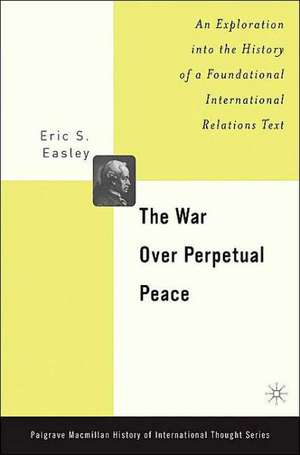The War Over Perpetual Peace: An Exploration into the History of a Foundational International Relations Text: The Palgrave Macmillan History of International Thought
Autor E. Easleyen Limba Engleză Hardback – 13 ian 2005
Din seria The Palgrave Macmillan History of International Thought
- 18%
 Preț: 723.35 lei
Preț: 723.35 lei - 18%
 Preț: 780.52 lei
Preț: 780.52 lei -
 Preț: 384.70 lei
Preț: 384.70 lei -
 Preț: 383.71 lei
Preț: 383.71 lei -
 Preț: 389.11 lei
Preț: 389.11 lei -
 Preț: 385.62 lei
Preț: 385.62 lei -
 Preț: 383.71 lei
Preț: 383.71 lei -
 Preț: 386.61 lei
Preț: 386.61 lei - 15%
 Preț: 640.24 lei
Preț: 640.24 lei - 15%
 Preț: 640.06 lei
Preț: 640.06 lei -
 Preț: 389.70 lei
Preț: 389.70 lei -
 Preț: 394.87 lei
Preț: 394.87 lei -
 Preț: 388.52 lei
Preț: 388.52 lei -
 Preț: 381.98 lei
Preț: 381.98 lei - 18%
 Preț: 724.63 lei
Preț: 724.63 lei -
 Preț: 383.50 lei
Preț: 383.50 lei - 15%
 Preț: 640.88 lei
Preț: 640.88 lei -
 Preț: 383.50 lei
Preț: 383.50 lei - 15%
 Preț: 640.71 lei
Preț: 640.71 lei - 18%
 Preț: 733.03 lei
Preț: 733.03 lei - 18%
 Preț: 727.48 lei
Preț: 727.48 lei -
 Preț: 417.90 lei
Preț: 417.90 lei - 15%
 Preț: 692.56 lei
Preț: 692.56 lei - 15%
 Preț: 690.11 lei
Preț: 690.11 lei -
 Preț: 391.61 lei
Preț: 391.61 lei - 15%
 Preț: 640.06 lei
Preț: 640.06 lei -
 Preț: 386.00 lei
Preț: 386.00 lei -
 Preț: 386.61 lei
Preț: 386.61 lei -
 Preț: 383.12 lei
Preț: 383.12 lei -
 Preț: 386.81 lei
Preț: 386.81 lei
Preț: 639.59 lei
Preț vechi: 752.45 lei
-15% Nou
Puncte Express: 959
Preț estimativ în valută:
122.42€ • 133.02$ • 102.90£
122.42€ • 133.02$ • 102.90£
Carte tipărită la comandă
Livrare economică 21 aprilie-05 mai
Preluare comenzi: 021 569.72.76
Specificații
ISBN-13: 9781403966520
ISBN-10: 1403966524
Pagini: 240
Ilustrații: IX, 228 p.
Dimensiuni: 140 x 216 x 19 mm
Greutate: 0.4 kg
Ediția:2004
Editura: Palgrave Macmillan US
Colecția Palgrave Macmillan
Seria The Palgrave Macmillan History of International Thought
Locul publicării:New York, United States
ISBN-10: 1403966524
Pagini: 240
Ilustrații: IX, 228 p.
Dimensiuni: 140 x 216 x 19 mm
Greutate: 0.4 kg
Ediția:2004
Editura: Palgrave Macmillan US
Colecția Palgrave Macmillan
Seria The Palgrave Macmillan History of International Thought
Locul publicării:New York, United States
Cuprins
Introduction PART 1: KANT'S PERPETUAL PEACE: AN INTRODUCTION TO THE TEXT, INTERPRETATIONS, AND PATTERNS The Textual Hooks of Interpretation PART 2: PEACE PROPOSALS ABOVE THE STATE LEVEL Reining in State Sovereignty: Interpretations From the Mid Nineteenth-Century to the End of WW1 State Sovereignty Curbed: Interpretations From the End of WW1 to the Mid 20th Century PART 3: PEACE PROPOSALS AT THE STATE LEVEL In Defense of State Sovereignty: Interpretations from the 1950s to the Early 1980s State Sovereignty Preserved I: A New Interpretation Takes Shape in the Early 1980s State Sovereignty Preserved II: Into the 1990s, the State-Centric Reading and Its Emphasis on the First Definitive Article Solidifies State Sovereignty Preserved III: Accent on the First Definitive Article Through the End of the 20th Century PART 4: SHIFTING HOPER, SHIFTING PATTERNS Pattern Formation as a Function of the Rise and Decline of Hopes for Peace Through International Organization From the Turmoil of International Anarchy to the Calm of the Liberal Peace Epilogue
Recenzii
"The War Over Perpetual Peace is certain to be regarded as unique and provocative. I would expect this work to bring about renewed interest and argument concerning the relationship between Kant's great prophetic history , it's interpretations and the actual course of affairs. It would be very useful in a graduate level course on international relations, on war and peace or on Kant's political and historical writings. "
- Professor Sharon Anderson-Gold, Department of Science and Technology Studies, Rensselaer Polytechnic Institute
'This book is a fascinating read for all those interested in international relations and Kant's political thought. Eric Easley outlines very perceptively the history of the reception of Kant's seminal work Perpetual Peace in the English speaking world from its first translation to its present position as a foundational text in international relations. Easley focuses particularly upon the reception of the work in the twentieth century in thelight of the tumultuous ups and downs in world politics that have occurred. He employs effectively Karl Mannheim's theory of ideology to map these developments and illustrates strikingly how the influence of Kant's text ebbs and flows with the times. The book ends with a discussion of the immense influence Kant's arguments have had in the period following the collapse of Soviet Communism and suggests that Kant's stress upon the progressive role of republican governments still has a great deal to be said for it.'
- Howard Williams, Department of International Politics, University of Wales
- Professor Sharon Anderson-Gold, Department of Science and Technology Studies, Rensselaer Polytechnic Institute
'This book is a fascinating read for all those interested in international relations and Kant's political thought. Eric Easley outlines very perceptively the history of the reception of Kant's seminal work Perpetual Peace in the English speaking world from its first translation to its present position as a foundational text in international relations. Easley focuses particularly upon the reception of the work in the twentieth century in thelight of the tumultuous ups and downs in world politics that have occurred. He employs effectively Karl Mannheim's theory of ideology to map these developments and illustrates strikingly how the influence of Kant's text ebbs and flows with the times. The book ends with a discussion of the immense influence Kant's arguments have had in the period following the collapse of Soviet Communism and suggests that Kant's stress upon the progressive role of republican governments still has a great deal to be said for it.'
- Howard Williams, Department of International Politics, University of Wales
Notă biografică
ERIC S. EASLEY joined the U.S. Foreign Service after receiving a Ph.D. from the London School of Economics and Political Science, UK.
